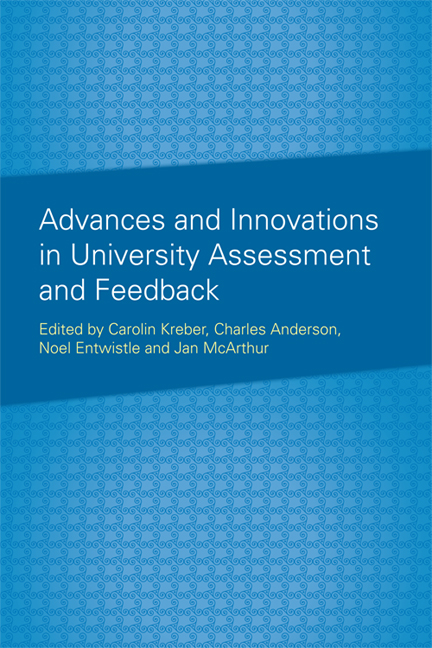Book contents
- Frontmatter
- Contents
- List of Tables and Figures
- Acknowledgements
- Foreword
- Introduction
- Part A Changing Perspectives on the Nature and Purposes of Assessment
- Part B Students' Perceptions of Assessment and Feedback
- Part C Reconceptualising Important Facets of Assessment
- Part D Innovations in Assessment Practices
- 10 Guiding Principles for Peer Review: Unlocking Learners' Evaluative Skills
- 11 Disruptions and Dialogues: Supporting Collaborative Connoisseurship in Digital Environments
- 12 Understanding Students' Experiences of Being Assessed: The Interplay between Prior Guidance, Engaging with Assessments and Receiving Feedback
- Notes on the Contributors
- Index
10 - Guiding Principles for Peer Review: Unlocking Learners' Evaluative Skills
from Part D - Innovations in Assessment Practices
Published online by Cambridge University Press: 05 August 2016
- Frontmatter
- Contents
- List of Tables and Figures
- Acknowledgements
- Foreword
- Introduction
- Part A Changing Perspectives on the Nature and Purposes of Assessment
- Part B Students' Perceptions of Assessment and Feedback
- Part C Reconceptualising Important Facets of Assessment
- Part D Innovations in Assessment Practices
- 10 Guiding Principles for Peer Review: Unlocking Learners' Evaluative Skills
- 11 Disruptions and Dialogues: Supporting Collaborative Connoisseurship in Digital Environments
- 12 Understanding Students' Experiences of Being Assessed: The Interplay between Prior Guidance, Engaging with Assessments and Receiving Feedback
- Notes on the Contributors
- Index
Summary
Focus of the Chapter
Enhancing students' capacity to regulate their own learning, independently of the teacher, is a central goal in higher education. All learners can and do self-regulate; however, those more effective at self-regulation assume greater responsibility for their academic performance and produce higher quality work. A pivotal construct underpinning learner self-regulation is evaluative judgement. To regulate one's own learning calls on a sophisticated capacity to make evaluative judgements about the quality of academic work as it is being produced. This chapter identifies peer review as the most productive platform for the development of evaluative skills and hence for learner self-regulation. Peer review is defined as an arrangement whereby students produce a written assignment and then review and write comments on assignments produced by their peers in the same topic domain. This chapter synthesises recent research on peer review in relation to the development of evaluative skills and the elaboration of knowledge. From this, it proposes a set of guiding principles for the design of peer review and provides some practical suggestions as to how each principle might be implemented.
Introduction
This chapter is dedicated to Dai Hounsell, who has made a significant contribution to our thinking about assessment and feedback in higher education over many years (Hounsell 2003, 2007; Hounsell et al. 2008). Not only has Dai carried out important research in this area, which has helped reshape current conceptions of assessment and feedback, but he has also been particularly focused on the actual practices of assessment within and across disciplines. Indeed, in a recent paper, Dai synthesised large bodies of research on assessment and feedback in different disciplines so as to identify and catalogue innovative approaches that others might adopt or adapt (Hounsell et al. 2007). One aspect of Dai's more recent work has been to promote a greater role for students in assessment practices (Hounsell 2008), for example, in using teacher feedback, in formulating assessment questions, in actively using assessment criteria and in assessing their own learning progress. This chapter builds upon and extends this aspect by looking at how students' evaluative skills might be developed not through being assessed or by being given feedback by others, but by engaging in evaluative acts and by delivering feedback themselves.
- Type
- Chapter
- Information
- Advances and Innovations in University Assessment and Feedback , pp. 197 - 224Publisher: Edinburgh University PressPrint publication year: 2014



